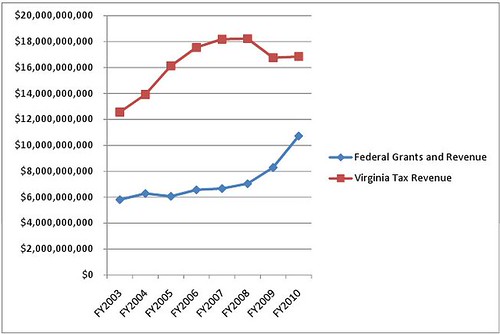Thanks to Del. Albert Pollard (D-99th) for the following.
 Sometimes in the process of writing a column, I know its importance is inversely proportionate to how interesting it is. This is one of those columns, in that my thesis is very important but it’s going to be a dreadfully boring read.
Sometimes in the process of writing a column, I know its importance is inversely proportionate to how interesting it is. This is one of those columns, in that my thesis is very important but it’s going to be a dreadfully boring read.
This past Election Day, two things happened. First, Virginia voters made the wise decision to increase the size of the “Rainy Day” fund deposit to a maximum of 15% of general fund revenue. Second, the already slim likelihood of more federal funds for the state got even slimmer.
Even after the votes have been tallied, some question why this constitutional amendment dealing with the “Rainy Day” fund even matters. Well, this is the boring, yet important, part.
First, thing to know is that the purpose of the “Rainy Day” fund is to establish a “savings account” so Virginia can have funds to deal with situations like we’ve experienced these last couple of years. In essence, Virginia will be “shorting” itself in the good times to cover the bad times.
The amount of the deposit into the “Rainy Day” fund is based on revenue growth during the previous six years. Since revenue has been declining these last couple of years, there has been no mandated deposit. According to Virginia’s Auditor of Public Accounts, the Commonwealth had less general fund money in 2010 ($14.3 billion) than we had in 2006 ($14.9 billion).
However, there was remarkable drop off in revenue from 2008 to 2009, so in the eyes of the formula there will soon be enough revenue growth to mandate a deposit in the fund. Thus, in 2013 there is a good chance we could have less revenue than in 2008, but have a mandated “Rainy Day” fund deposit of close to $200 million.
And the new constitutional amendment means these “Rainy Day” fund deposits will continue until the balance becomes 15% of the total general fund budget.
But the second occurrence from last Tuesday’s elections is less obvious. The Commonwealth has been balancing its budget each year simply because of increased federal revenue transfers. During that same 2006 to 2010, where Virginia’s general fund money decreased, the amount of federal dollars the Commonwealth received grew from $3.9 billion to $7.4 billion – the greatest percentage coming in recent years as the federal government tried to help offset all states’ declining revenue during this recession.
So, let’s assume the federal government reverts back to 2006 spending levels. That means Virginia will receive nearly half the money it currently receives and general fund revenues will still be lower than 2008 levels. And, Virginia will have an additional budget line item of $200 million for the “Rainy Day” fund deposit.
Cutting is always hard, but it will be even harder because as the population grows and ages, Virginia will have more kids in school, more prisoners, more police, more sheriffs, more eligible elderly for nursing homes, etc.
The government should never spend more than they make – and in Virginia we constitutionally cannot. But that doesn’t make the decisions to cut any easier. The combination of Virginia’s decreased federal revenue and increased commitment to the “Rainy Day” fund will mean more tough times coming – and that will be even more painful than reading this column.

![[UPDATED with Official Announcement] Audio: VA Del. Dan Helmer Says He’s Running for Congress in the Newly Drawn VA07, Has “the endorsement of 40 [House of Delegates] colleagues”](https://bluevirginia.us/wp-content/uploads/2026/02/helmermontage.jpg)
















